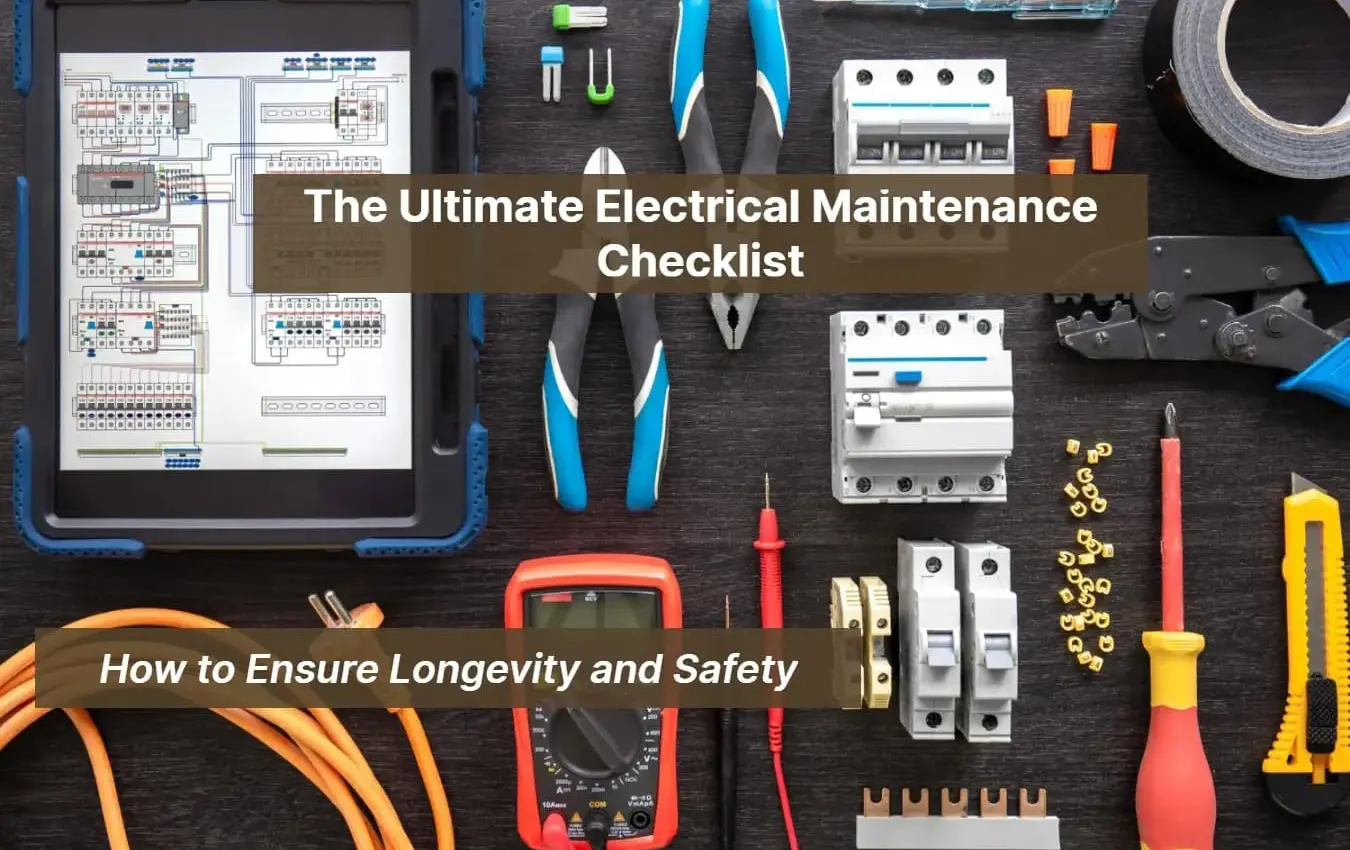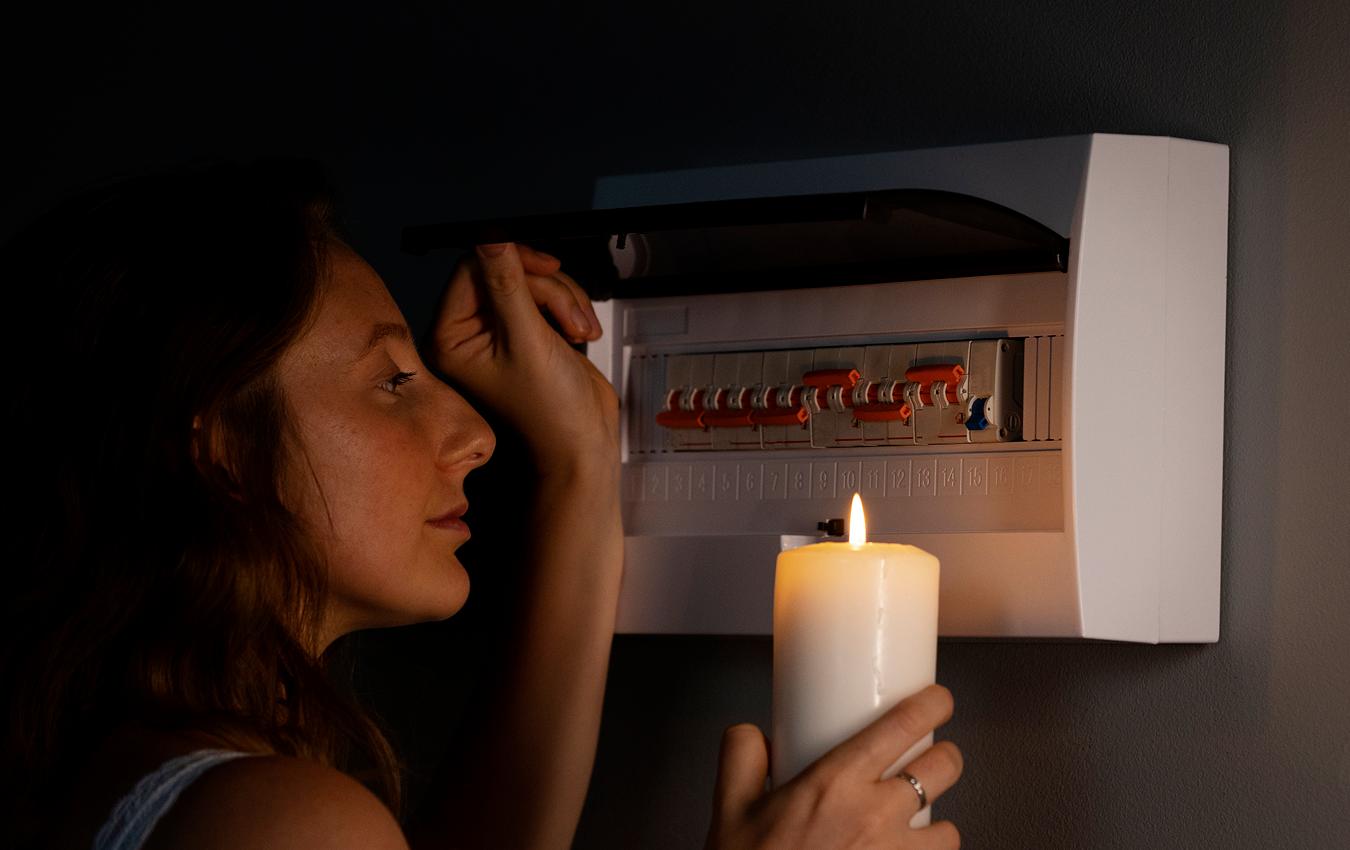Are you looking to ensure the longevity and safety of your electrical systems? Look no further than our ultimate electrical maintenance checklist. With the potential for electrical hazards and malfunctions, regular maintenance is essential to preventing accidents and costly repairs. In this comprehensive guide, we’ll walk you through all the necessary steps to keep your electrical systems in top shape.
From testing outlets and checking for loose connections to inspecting circuit breakers and grounding systems, our checklist covers it all. We’ll also provide you with valuable tips on maintaining electrical appliances and maintaining overall electrical safety. By following our checklist, you can minimize the risk of electrical fires, shocks, and other hazards.
Don’t wait until an electrical problem occurs—take proactive steps to protect your home or workplace. With our ultimate electrical maintenance checklist, you’ll have peace of mind knowing that your electrical systems are in optimal condition. So let’s dive in and start safeguarding your electrical systems today.
Importance of electrical maintenance
Maintaining your electrical systems is crucial for both safety and longevity. Electrical malfunctions can lead to fires, shocks, and other hazards that can cause significant damage to property and endanger lives. By conducting regular maintenance, you can identify and address potential issues before they escalate into major problems.
Regular electrical maintenance also helps extend the lifespan of your electrical systems. Over time, wear and tear can degrade components and connections, leading to reduced efficiency and an increased risk of failure. By catching and resolving minor issues early on, you can avoid costly repairs or even the need for a complete system replacement.
Maintaining your home’s electrical system is essential to maintaining a safe and reliable power supply.
Premier Electrical Services offers scheduled electrical system maintenance services, including health inspections, appliance replacements, electrical upgrades for energy efficiency, and home wiring troubleshooting. Call us at phone 954-900-1696 to request a consultation, or email us using the form below!
Electrical maintenance checklist overview
To effectively maintain your electrical systems, it’s important to have a comprehensive checklist that covers all the necessary tasks. Here is an overview of the key areas to focus on:
Checking Electrical Fixtures and Appliances
Start by inspecting all electrical fixtures and appliances in your home or workplace. Look for any signs of damage, such as frayed wires or loose connections. Replace or repair any faulty fixtures or appliances to prevent electrical hazards.
In addition, make sure that all electrical cords are in good condition and not overloaded. Overloaded cords can overheat and cause fires. Consider using surge protectors to safeguard your devices and prevent electrical damage.
Inspecting Electrical Wiring and Connections
Next, thoroughly inspect your electrical wiring and connections. Look for any signs of wear, such as exposed wires or loose connections. These issues can lead to electrical shorts, sparks, or even fires. If you notice any problems, it’s important to address them promptly by hiring a qualified electrician.
Additionally, pay attention to the condition of your electrical panels and junction boxes. Make sure they are securely mounted and free of debris. Regularly check for any signs of overheating or unusual noises coming from these components.
Testing Electrical Outlets and Switches
Properly functioning electrical outlets and switches are essential for the safe operation of your electrical systems. Use a circuit tester to verify that outlets are wired correctly and are grounded. Test each outlet and switch to ensure they are securely attached to the wall and functioning properly. Replace any defective outlets or switches immediately.
It’s also a good practice to periodically clean your outlets and switches to remove dust and debris. This helps maintain good electrical contact and reduces the risk of overheating.
Maintaining Electrical Panels and Circuit Breakers
Your electrical panel and circuit breakers play a crucial role in protecting your electrical systems from overloads and short circuits. Regularly inspect the panel for any signs of damage or corrosion. Clean the panel to remove dust and debris that could impair its performance.
Test each circuit breaker regularly to ensure they are functioning correctly. If you notice any breakers frequently tripping, it may indicate an underlying electrical problem that needs to be addressed by a professional electrician.
Addressing Potential Hazards and Safety Concerns
Electrical hazards can arise from various sources, including outdated wiring, improper grounding, or overloaded circuits. It’s important to address these potential hazards to maintain a safe electrical environment.
Consider conducting a thorough audit of your electrical systems to identify any potential risks. This may involve inspecting your grounding system, verifying the integrity of your electrical service entrance, and checking for proper insulation. If you’re unsure about any aspect of electrical safety, consult a licensed electrician, who can provide expert advice and assistance.
Hiring a Professional Electrician for Maintenance
While some electrical maintenance tasks can be performed by homeowners or facility managers, it’s important to recognize the limits of your expertise. Complex electrical work should always be handled by a qualified professional to ensure safety and compliance with electrical codes.
When it comes to major maintenance tasks, such as panel upgrades, rewiring, or troubleshooting complex electrical issues hiring a professional electrician is highly recommended. They have the knowledge, skills, and tools to perform the work safely and effectively.
Electrical Maintenance Schedule and Reminders
To ensure that you stay on top of your electrical maintenance, it’s a good idea to establish a schedule and set reminders for regular inspections and tasks. Create a checklist tailored to your specific needs and follow it diligently.
Consider scheduling an annual or bi-annual inspection by a professional electrician to thoroughly assess the condition of your electrical systems. They can identify any potential issues that may have been overlooked and provide recommendations for maintenance or upgrades.
Checking electrical fixtures and appliances
Don’t wait until an electrical problem occurs—take proactive steps to protect your home or workplace. With our ultimate electrical maintenance checklist, you’ll have peace of mind knowing that your electrical systems are in optimal condition. Regular maintenance ensures safety and extends the lifespan of your electrical systems, saving you from costly repairs or replacements.
Remember to check electrical fixtures and appliances inspect wiring and connections, test outlets and switches, maintain electrical panels and circuit breakers, address potential hazards, and hire a professional electrician when needed. Establish a maintenance schedule and set reminders to stay on top of these tasks.
By following our comprehensive checklist and taking the necessary precautions, you can minimize the risk of electrical fires, shocks, and other hazards. Invest in the longevity and safety of your electrical systems today.
Inspecting electrical wiring and connections
The first step in maintaining your electrical systems is to regularly check all fixtures and appliances. Start by visually inspecting your light fixtures, ceiling fans, and other electrical fixtures for any signs of wear or damage. Look out for loose screws, cracks, or exposed wires. Additionally, make sure that all light bulbs are properly installed and functioning.
Next, move on to your electrical appliances. Check the power cords for any fraying or exposed wires. Inspect the plugs to ensure they fit securely into outlets and don’t wobble. If you notice any damaged cords or plugs, replace them immediately to avoid potential hazards.
It’s also important to keep your appliances clean and free from dust or debris. Regularly dust off your electrical appliances and use a small brush to clean any hard-to-reach areas. This will help prevent dust buildup, which can lead to overheating and electrical fires.
Remember, never attempt to repair or modify electrical fixtures or appliances yourself unless you have the necessary expertise. Always consult a qualified electrician for any repairs or replacements.
Testing electrical outlets and switches
Properly functioning electrical wiring is crucial for the safety and efficiency of your electrical systems. Inspecting your wiring regularly can help identify potential issues before they escalate into major problems. Here are a few key steps to follow when inspecting your electrical wiring and connections:
1. Start by turning off the power to the area you’ll be working on. This can be done by switching off the circuit breaker or removing the fuse.
2. Carefully examine the electrical wires for any signs of wear, such as fraying or discoloration. Pay close attention to areas where the wiring is exposed, such as behind appliances or in the attic.
3. Check all wire connections to ensure they are tight and secure. Loose connections can lead to overheating and electrical failures. Use a screwdriver to tighten any loose screws or connectors.
4. If you come across any damaged or deteriorated wiring, it’s best to call a licensed electrician to assess and repair the issue. Trying to fix faulty wiring yourself can be extremely dangerous.
Regularly inspecting your electrical wiring and connections will help prevent electrical malfunctions and reduce the risk of electrical fires or shocks.
Maintaining electrical panels and circuit breakers
Faulty electrical outlets and switches pose a serious safety risk and should be promptly addressed. Regularly testing your outlets and switches is an essential part of electrical maintenance. Here’s how you can ensure they are functioning properly:
1. Start by turning off the power to the circuit you’ll be working on. This can be done by switching off the circuit breaker or removing the fuse.
2. Use a voltage tester to check each outlet and switch. Insert the tester into the slots of the outlet or switch terminals and observe the reading. If the tester doesn’t light up or indicates a faulty reading, there may be an issue with the wiring or the outlet or switch itself.
3. If you encounter any faulty outlets or switches, it’s best to have them replaced by a professional electrician. Attempting to fix them yourself can lead to further damage or injury.
Regularly testing your electrical outlets and switches will help ensure they are in good working condition, minimizing the risk of electrical hazards.
Addressing potential hazards and safety concerns
Your electrical panel and circuit breakers play a crucial role in distributing electricity throughout your home or workplace. Regular maintenance of these components is essential to prevent electrical overloads and protect against potential hazards. Here’s what you need to do:
1. Start by turning off the main power switch on your electrical panel. This will cut off the electricity supply to the entire building.
2. Inspect the electrical panel for any signs of damage, such as rust, loose wires, or burnt smells. If you notice any abnormalities, contact a licensed electrician for further inspection and repair.
3. Test each circuit breaker by flipping it off and then back on. This will help ensure they are functioning properly and can effectively interrupt the flow of electricity in case of an overload.
4. Label each circuit breaker to clearly identify which area or appliance it controls. This will make it easier to troubleshoot electrical issues in the future and ensure the safety of anyone working on the electrical system.
Regular maintenance of your electrical panels and circuit breakers is essential to prevent electrical overloads and ensure the efficient distribution of electricity throughout your property.
Hiring a professional electrician for maintenance
In addition to regular maintenance, it’s important to address potential hazards and safety concerns in your electrical systems. Here are a few common issues to watch out for:
Overloaded circuits
Avoid plugging too many appliances into a single circuit. Overloading can cause overheating and increase the risk of electrical fires. Spread your appliances across multiple circuits to distribute the load evenly.
Damaged extension cords
Inspect your extension cords for any signs of damage, such as fraying or exposed wires. Replace damaged cords immediately to prevent electrical shocks or fires.
Faulty ground fault circuit interrupters (GFCIs)
GFCIs are designed to protect against electrical shocks. Test your GFCIs regularly by pressing the “test” button and ensuring the power is cut off. If the GFCI fails to trip, it should be replaced.
Outdated electrical systems
If your property has outdated electrical systems, consider upgrading to meet current safety standards. Older systems may not be equipped to handle the electrical demands of modern appliances.
By addressing these potential hazards and safety concerns, you can significantly reduce the risk of electrical accidents and ensure the safety of your home or workplace.
Electrical maintenance schedule and reminders
While regular maintenance tasks can be performed by homeowners, some electrical maintenance requires the expertise of a professional electrician. Hiring a licensed electrician for certain tasks ensures that the work is done safely and up to code. Here are a few instances where it’s best to call in the professionals:
Major electrical repairs
If you encounter any major electrical issues, such as frequent power outages, flickering lights, or circuit breaker trips, it’s best to consult a licensed electrician. These issues may indicate underlying problems that require professional attention.
Electrical system upgrades
If you’re planning to upgrade your electrical system, such as by installing new circuits or outlets, it’s crucial to hire a professional electrician. They will ensure the work is done safely and in compliance with local electrical codes.
Electrical inspections
When buying or selling a property, it’s recommended to have an electrical inspection performed by a licensed electrician. They will assess the condition of the electrical system and identify any potential safety hazards or code violations.
Remember, electrical work is complex and potentially dangerous. It’s always better to be safe than sorry. Hiring a professional electrician for maintenance tasks will give you peace of mind, knowing that the work is done correctly and safely.
Conclusion
To stay on top of your electrical maintenance tasks, it’s helpful to create a schedule and set reminders for yourself. Here’s a suggested electrical maintenance schedule:
Monthly: Test GFCIs and smoke detectors, inspect electrical fixtures and appliances for damage, and clean dust off electrical appliances.
Quarterly: Inspect electrical wiring and connections test electrical outlets and switches, and check for any signs of wear or damage in your electrical panels and circuit breakers.
Annually: Hire a licensed electrician to perform a comprehensive electrical inspection, address any major issues, and ensure your electrical system is up to code.
Setting reminders on your calendar or using digital tools can help you stay organized and ensure that you don’t miss any important electrical maintenance tasks.
Are you interested in the annual maintenance of the electrical system of your home?
To ensure your safety and comfort, Premier Electrical Services will service your electrical system swiftly and effectively. Our qualified electricians may also provide electrical improvements, appliance replacements, wire repairs, and upgrades, as well as electrical panel replacements. Call us right away at 954-900-1696 or use our online form to arrange electrical panel service!
Check out the latest news:
- Commercial Energy Audit: Spotting the Sources of Energy Waste
- Protect Your Fort Lauderdale Home with Whole-House Surge Protection
- Power Outages in Fort Lauderdale: How to Protect Your Home
- Preparing for a Home Rewiring Project: A Checklist for Homeowners
- 5 Critical Signs You Need a Whole-House Surge Protector





